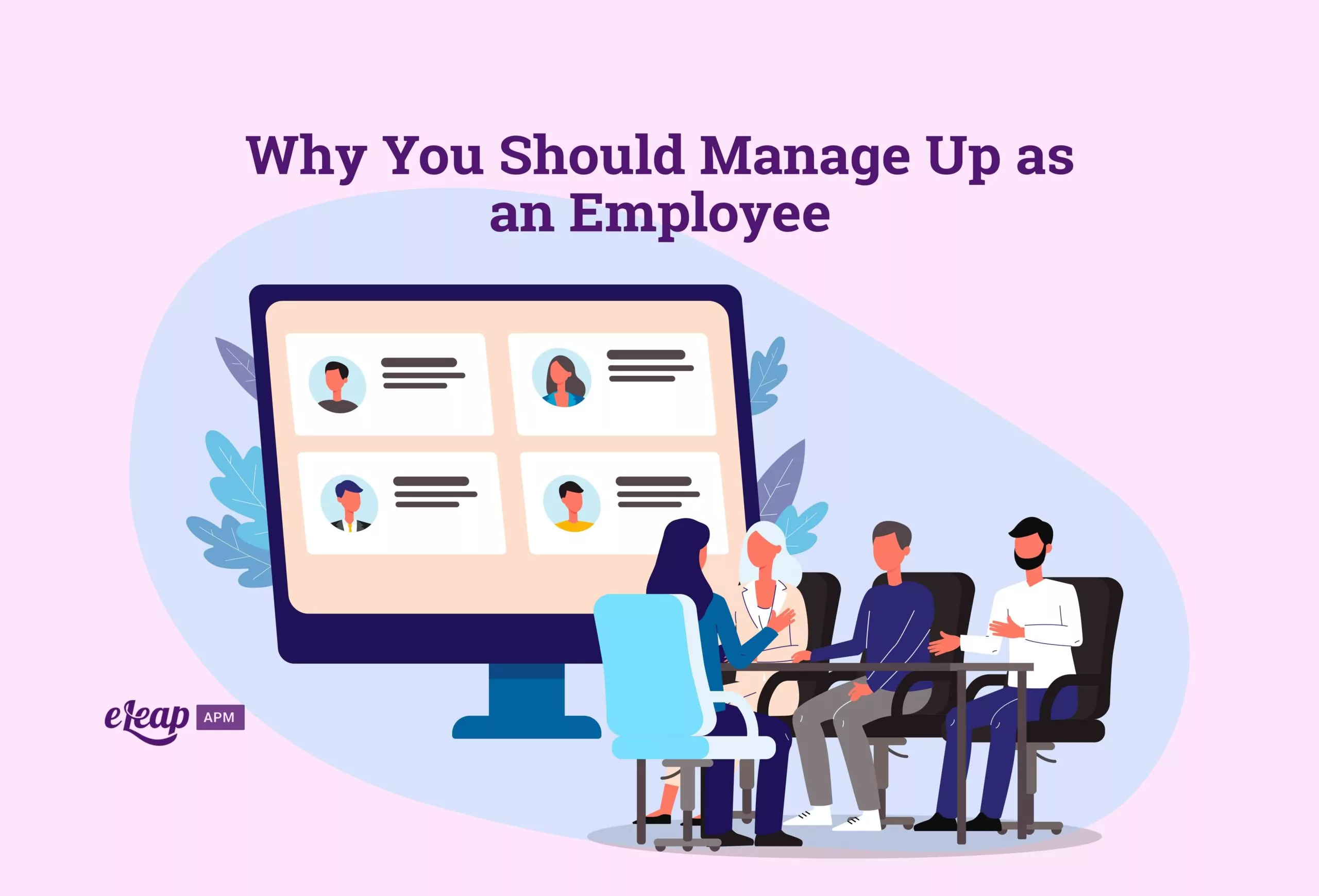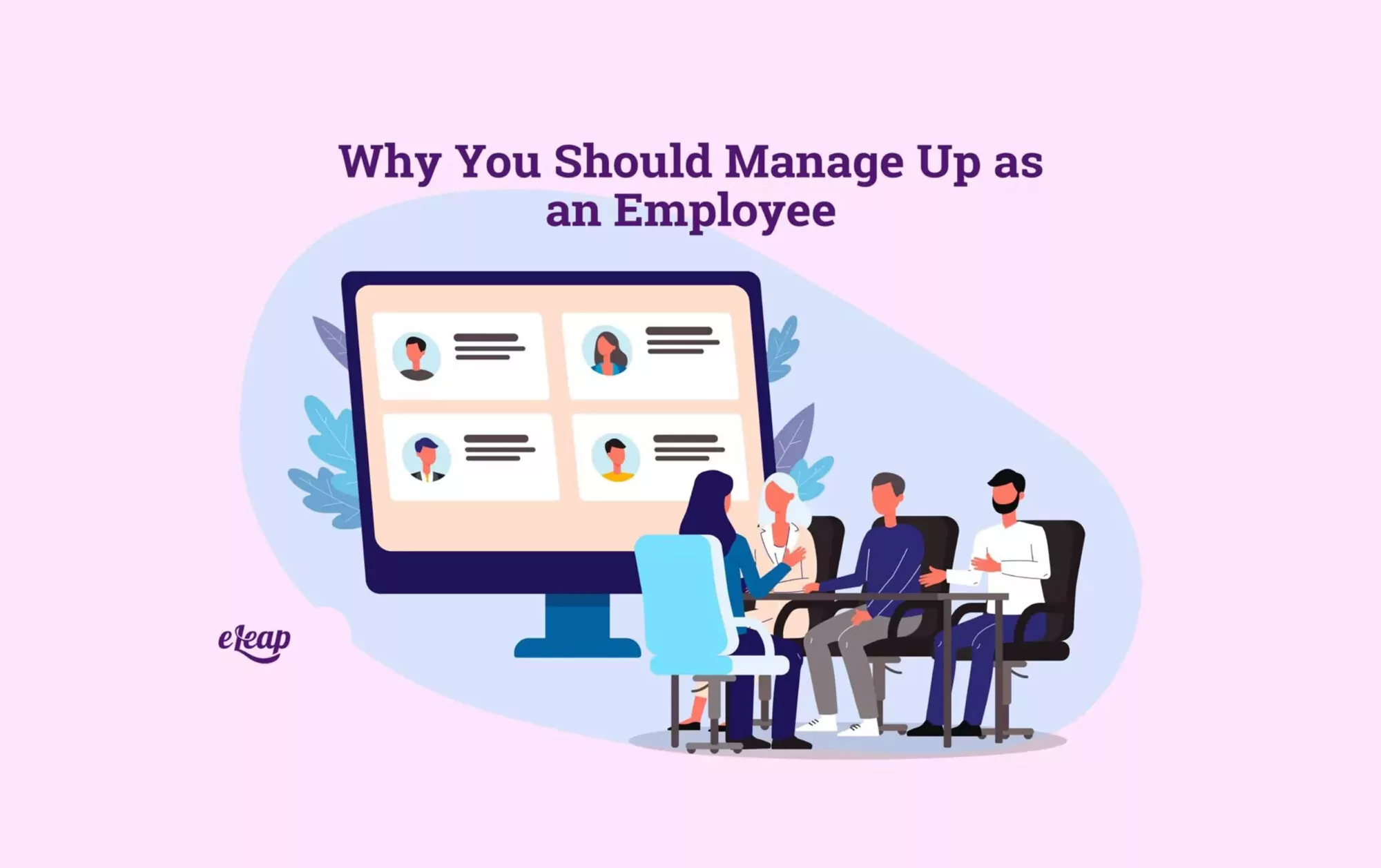Why You Should Manage Up as an Employee

People rarely talk about it but learning how to manage up as an employee can make your day-to-day job more enjoyable, as well as gain the respect of your boss, and put you on the radar for great promotion opportunities.
Do you not know what managing up is, exactly? That is okay – how to manage up is a skill that most people don’t talk about regarding career development, but it can be insanely rewarding for employees who learn how to it efficiently. This article will dive deep into what managing up means and how you can use it to feel more fulfilled in your role and prosper in your career.

What Does it Mean to Manage Up?
When someone says you should “manage up,” it can be a confusing term. Managers spend all day, every day, managing down; meaning they manage the roles and tasks of those below them and this is much of their job description. Sadly, this relationship often becomes a one-way street. Employees take direction, feedback, and orders from their managers, without ever thinking that their managers may like to hear their feedback or even get some support from their subordinates in certain areas.
Put simply, managing up is about making your manager’s life easier by being a more communicative and employable member of the team. When you manage up, you turn communication between subordinate and manager into a two-way, open, and honest connection.
It’s an intentional and purposeful mission you set out on with your manager to work with them toward certain goals instead of blindly taking orders. Overall, learning how to manage up will benefit your relationship with your boss, but also benefit the company, when done right.
Why Learning How to Manage Up Matters
If your boss doesn’t know what you need, they can’t effectively manage you. If you don’t learn how to give open and honest feedback to your manager, they will never know what you need. This, in essence, is the importance of managing up.
Managing up starts with building an honest and authentic connection with your boss. You should find commonalities between the two of you, even if you’re nothing alike on the surface. Contrary to popular belief, having a personal connection with your boss can build trust between you, leading the way to more honest communication.
Trust is a crucial component of managing up. If your boss trusts you, they will respect your opinion and feedback. A boss who receives feedback from an employee they don’t know well, or don’t trust, might not take it seriously or consider it at all.
Over time, building a bond will result in a big payoff for the employee and the employer. As an employee, you will be better advocated for within the organization. If a leadership role becomes available, your boss may be quicker to nominate someone who got to know them and is efficient at giving helpful feedback, than someone who simply took orders.
Plus, managers have a lot on their plates. Having an employee that they can trust feels good to them. Managers will appreciate employees who can manage up and get to know them because, at times when they need an honest opinion, or even an employee to vouch for them, they will know they have someone who they can trust.
Getting in the Mindset to Manage Up
If you are not used to this type of communication with higher-ups, you may need to change your fundamental beliefs about what an employee-to-manager relationship should look like. To evaluate if your current actions are aligned with managing up, you can ask yourself these questions:
- “Have I been taking responsibility for the communication and relationship with my boss?” If your answer is no, evaluate how you can take more responsibility for asking for what you need from your boss.
- “Am I aware of my manager’s expectations? Do they feel realistic?” If you are unaware of your manager’s expectations, that needs to change to be able to manage up. It’s time to have an honest two-way conversation about their expectations. If you know their expectations but think they are unrealistic, it’s also time to talk. You can present your manager with a logical and levelheaded presentation of why their current expectations are unrealistic and propose solutions to create goals together that are more realistic for your situation.
- “Does my manager know what resources I need to obtain my goals?” If the answer is no, it’s time to lay out what resources you need. Your boss can’t help you if you are unwilling to help yourself. Helping yourself starts with getting the right tools in place to do well in your job.
If you find yourself answering yes to most of the above questions, there’s a large possibility you are already doing some managing up without knowing it. Sure, some employees and managers just naturally “click” for one reason or another, but most times, a successful relationship between a manager and an employee takes work on both sides.
That said, a lot of employees might manage up naturally, as an attempt to get to know their manager or make a good impression on them. However, you can always improve on these skills to be more deliberate and purposeful once you’re aware of how to do so.
Actions You Can Take to Start Managing Up
Whether you are just learning how to manage up or have been for a while but want to fine-tune your skills, you can always benefit from some intentional actions to improve your relationship with your boss!
Try the below tips to start building a more solid relationship with your boss:
- Understand your boss as a person. In much of society, it’s common to warn employees against creating deeply personal relationships with their boss. However, there is a fine line. Sure, you do not want to enter a romantic relationship with your boss or get them tied up in any employee-level drama, but that doesn’t mean you can’t show interest in who they are. You need to get an idea of both who you are and who your manager is to understand how you will both work best together. This can be done by asking your manager questions about their hobbies or personality types or sharing your personality type with them, and an array of other ways. In short – don’t be afraid to let your boss in on what makes you “you,” and don’t hesitate to show interest in learning more about them, too.
- Understand expectations. Once you’ve built a foundation of personal understanding and trust with your manager, it’s important to dive into their expectations for you. The information you uncover about your boss, using the last tip, will be helpful here. For example, if you know your boss is highly ambitious, with a tendency toward lofty goals, you might know that’s why their expectations of you seem unrealistic. You’ll likely find it easier to approach your boss about lowering their expectations with the background knowledge that they set high goals for everyone, even themselves. Regardless of who your boss is as a person, you should ask them to clearly outline your current goals and expectations (if they haven’t done so already). Plus, if any goals seem off-base or unrealistic, you should let them know why you feel that way and think of creative compromises for your expectations that will make both parties happy.
- Prioritize communication. The sad reality is – you will likely have a different communication style than your manager. Some will vary greatly, or in other cases, you will be similar in styles of communication. Regardless, no two people communicate the same, which is why it’s so important to learn your manager’s unique communication style. For example, if your manager expresses that they don’t like being messaged between 1-2 pm, refrain from messaging them at that time, even if it feels like it can’t wait. Similarly, if your manager is frequently communicating via text, but you prefer email, you should let your manager know your preference and why. This way, you can harmoniously communicate with your boss without feeling subjected to unwanted means or modes of communication. Wherever possible, you should find ways to work around your boss’s communication style. After all, they are the manager, and it shows adaptability to be able to handle different personalities in the workplace, even when it’s your boss in question.
- Give helpful suggestions. If, during a meeting or call, your manager expresses frustration with figuring out a solution to a certain problem, brainstorm ways you can help. Don’t use this as an opportunity to outsmart your boss publicly. After the meeting, sit down and think if the problem your manager is facing would be something your expertise could help with. If you can think of some new ideas to solve their problem, ask for ten minutes of their time, and explain that you wanted to help them solve the “X” problem they were facing. Even if they don’t end up using your solution, they’ll be impressed that you went out of your way to help a superior solve a problem.
Bottom Line
Why does no one talk about how important it is for employees to manage up? Perhaps because no one recognizes this skill, or because an employee who naturally manages up is just looked at as a stellar employee when they are just exhibiting a skill that any employee could learn.
As a manager, it may be beneficial to teach your staff the fundamentals of managing up. It will save you time developing employees. On the other hand, as an employee, learning to manage up will make your work life much more enjoyable, reduce miscommunications and disagreements with your boss, and make you look more ready for leadership roles.
Overall, learning to manage up is just as useful for the employee as it is for the manager. Start thinking about ways you can implement the key factors of managing up into your relationship with your boss, and watch as you begin to thrive in your role!